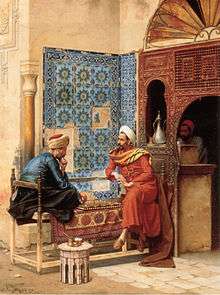Al-Tha'alibi

Al-Tha'ālibī (Abu Manşūr 'Abd ul-Malik ibn Mahommed ibn Isma'īl) (961–1038), Arabic: الثعالبي, was an Iranian writer, born in Nishapur, Iran. It is not clear that he was a Persian or Arab.[1] Although he wrote prose and verse of his own, he was most famous for his anthologies and collections of epigrams. Like many other Arabic writers of his time, he does not always distinguish between his own and other people's work. Of the twenty-nine works known to have been written by him, the most famous is his Kitāb Yatīmat ud-Dahr, on the poets of his own and earlier times, arranged according to the countries of the poets, and containing valuable extracts (published at Damascus, 4 vols., 1887). Another of his works, the Kitāb Fiqh ul-Lugha, is lexicographical, a dictionary, the words being arranged in semantic subject classes. It has been published at Paris (1861), Cairo (1867), and Beirut (1885, incomplete).[2][3] His "Book of curious and entertaining information" (Lata'if al-ma'arif) was translated into English by Clifford Edmund Bosworth (Edinburgh University Press, 1968).
Notes
- ↑ "Abu Manşūr Tha'ālibī". Center for the Great Islamic Encyclopedia. Retrieved 15 February 2016.
- ↑ Thatcher 1911, p. 716.
- ↑ Thatcher 1911, p. 716 notes: For his other works see Brockelmann 1898, pp. 284–286
References
- Brockelmann, Carl (1898), Geschichte der Arabischen Literatur, i, Weimar, pp. 284–286
 This article incorporates text from a publication now in the public domain: Thatcher, Griffithes Wheeler (1911). "Tha'ālibī". In Chisholm, Hugh. Encyclopædia Britannica. 26 (11th ed.). Cambridge University Press. p. 716.
This article incorporates text from a publication now in the public domain: Thatcher, Griffithes Wheeler (1911). "Tha'ālibī". In Chisholm, Hugh. Encyclopædia Britannica. 26 (11th ed.). Cambridge University Press. p. 716.
External links
| Arabic Wikisource has original text related to this article: |